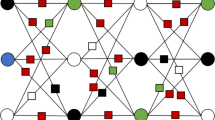Abstract
Blind quantum computation (BQC) allows a client who has only limited quantum power to achieve quantum computation with the help of a remote quantum server and still keep the client’s input, output, and algorithm private. Recently, Kashefi and Wallden extended BQC to achieve two-party quantum computation which allows two parties Alice and Bob to perform a joint unitary transform upon their inputs. However, in their protocol Alice has to prepare rotated single qubits and perform Pauli operations, and Bob needs to have a powerful quantum computer. In this work, we also utilize the idea of BQC to put forward an improved two-party quantum computation protocol in which the operations of both Alice and Bob are simplified since Alice only needs to apply Pauli operations and Bob is just required to prepare and encrypt his input qubits.



Similar content being viewed by others
References
Nielsen, M.A., Chuang, I.L: Quantum Computation and Quantum Information. Cambridge University Press (2010)
Shor, P.W.: In: Proceedings of the 35th Annual IEEE Symposium on the Foundations of Computer Science, pp. 124–134 (1994)
Grover, L.K.: Phys. Rev. Lett. 79, 325 (1997)
Morimae, T., Fujii, K.: Phys. Rev. A 87, 050301(R) (2013)
Fitzsimons, J.F.: npj Quant. Inf. 3, 23 (2017)
Childs, A.M.: Quant. Inf. Comput. 5, 456 (2005)
Arrighi, P., Salvail, L.: Int. J. Quant. Inf. 04, 883 (2006)
Broadbent, A., Fitzsimons, J., Kashefi, E.: In: Proceedings of the 50th Annual IEEE Symposium on Foundations of Computer Science, pp. 517–526 (2009)
Raussendorf, R., Briegel, H.J.: Phys. Rev. Lett. 86, 5188 (2001)
Morimae, T., Fujii, K.: Phys. Rev. Lett. 111, 020502 (2013)
Li, Q., Chan, W.H., Wu, C., Wen, Z.: Phys. Rev. A 89, 040302(R) (2014)
Sheng, Y.B., Zhou, L.: Sci. Rep. 5, 7815 (2015)
Takeuchi, Y., Fujii, K., Ikuta, R., Yamamoto, T., Imoto, N.: Phys. Rev. A 93, 052307 (2016)
Sheng, Y.B., Zhou, L.: Available at arXiv:1609.08902 (2016)
Kashefi, E., Wallden, P.: Available at arXiv:1510.07408 (2015)
Fitzsimons, J.F., Kashefi, E.: Phys. Rev. A 96, 012303 (2017)
Dunjko, V., Kashefi, E., Leverrier, A.: Phys. Rev. Lett. 108, 200502 (2012)
Morimae, T., Fujii, K.: Nat. Commun. 3, 251 (2012)
Li, Q., Li, Z., Chan, W.H., Zhang, S., Liu, C.: Phys. Lett. A 382, 938 (2018)
Brennen, G.K., Miyake, A.: Phys. Rev. Lett. 101, 010502 (2008)
Morimae, T.: Phys. Rev. Lett. 109, 230502 (2012)
Sueki, T., Koshiba, T., Morimae, T.: Phys. Rev. A 87, 060301 (2013)
Mantri, A., Pérez-Delgado, C.A., Fitzsimons, J.F.: Phys. Rev. Lett. 111, 230502 (2013)
Kong, X., Li, Q., Wu, C., Yu, F., He, J., Sun, Z.: Int. J. Theor. Phys. 55, 3001 (2016)
Kashefi, E., Wallden, P.: Cryptography 1, 6 (2017)
Kashefi, E., Pappa, A.: Available at arXiv:1606.09200 (2016)
Sheng, Y.B., Zhou, L.: Sci. Bull. 62, 1025 (2017)
Yao, A.C.: In: Proceedings of the 23rd Annual IEEE Symposium on Foundations of Computer Science, pp. 160–164 (1982)
Dupuis, F., Nielsen, J.B., Salvail, L.: In: Advances in Cryptology-Crypto 2010, pp. 685–706 (2010)
Naor, M., Pinkas, B.: In: Proceedings of the 31st Annual ACM Symposium on Theory of Computing, pp. 245–254 (1999)
Osorio, C.I., Bruno, N., Sangouard, N., Zbinden, H., Gisin, N., Thew, R.T.: Phys. Rev. A 86, 023815 (2012)
Zhou, L., Sheng, Y.B.: Laser Phys. Lett. 12, 045203 (2015)
Zwerger, M., Briegel, H.J., Dur, W.: Phys. Rev. A 90, 012314 (2014)
Zhou, L., Sheng, Y.B.: Sci. Rep. 6, 28813 (2016)
Du, F.F., Deng, F.G.: Science china physics. Mech. Astron. 58, 040303 (2015)
Sheng, Y.B., Pan, J., Guo, R., Zhou, L., Wang, L.: Science china physics. Mech. Astron. 58, 060301 (2015)
Acknowledgements
We would like to thank Zhulin Li, Chengdong Liu, and Yu Peng for useful discussion and suggestion. This work was supported by the Joint Funds of the National Natural Science Foundation of China and China General Technology Research Institute (Grant No. U1736113), and the Hunan Provincial Natural Science Foundation of China (Grant No. 2018JJ2403).
Author information
Authors and Affiliations
Corresponding author
Rights and permissions
About this article
Cite this article
Sun, Z., Li, Q., Yu, F. et al. Application of Blind Quantum Computation to Two-Party Quantum Computation. Int J Theor Phys 57, 1864–1871 (2018). https://doi.org/10.1007/s10773-018-3711-9
Received:
Accepted:
Published:
Issue Date:
DOI: https://doi.org/10.1007/s10773-018-3711-9




